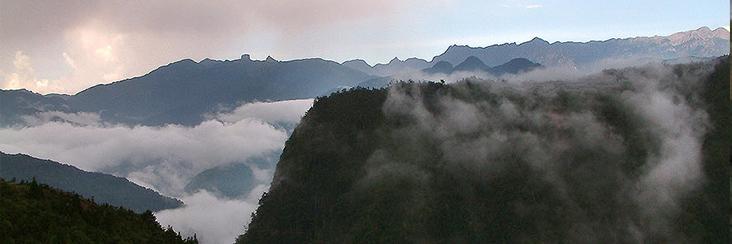
Leafhopper High Mountain Oolong Tea | Eco-Cha Tea Club

Our expressed intention in sharing this batch of tea is to offer Eco-Cha Tea Club members a chance to experience the original unroasted flavor profile of a tea type that, in the local Taiwanese dialect, is simply called "Leafhopper Tea".
This month's batch of tea comes from the most recently developed High Mountain Oolong Tea producing region, located in northern Taiwan. Here in the industry, it is most commonly referred to as Guanwushan, in the vicinity of Xueba National Park (photo above). The rugged high elevation slopes of the northernmost central mountain range provide an ideal climate for High Mountain Tea production.
This crop was harvested in June, when the new leaf growth following early spring harvest was allowed to grow naturally. In effect, it was an invitation for the legendary Green Leafhopper to come and perform its magic. This tiny grasshopper-like insect likes to feed on the sap of the new leaves, which results in a chemical composition in the leaf that offers a unique honey-essence flavor in the tea. The Leafhopper is what creates the renowned Oriental Beauty Oolong Tea from northern Taiwan, and the subsequent Concubine Oolong produced in central Taiwan.

In acknowledgement of the presence of the Leafhopper during this growing season, the farmer processed his leaves accordingly — allowing them to oxidize significantly more than a standard High Mountain Oolong Tea. The effect of the Leafhopper, combined with this customized processing results in a particularly full-flavored, strong character. Tea leaves of this constitution literally have more substance — providing a rich, vibrant, and complex flavor profile.
Also known as "bug-bitten tea" in tribute to the Leafhopper's effect, it has, only in the last decade or so, become a hot item in the local industry. A prominent reason for this recent spike in demand is that a crop of "bug bitten tea" by default defines it as being naturally farmed, without the use of chemical pesticides. So we not only get a unique, robust character of tea, we also get to support natural tea cultivation in the modernized production of world-class Taiwanese Oolong Tea.

In sum, we are not only endlessly intrigued by the magical role of the the Green Leafhopper in the making of this tea. We are also thrilled to support the production of a specialty tea that requires natural farming methods. Furthermore, each batch of Leafhopper tea is unique, based on the extent of influence by the Leafhopper in combination with the consequent batch-specific methods of processing it.
Only recently have farmers begun to venture a gamble in producing a crop of tea that is difficult to navigate. There simply is no standard processing method to resort to — the farmer must rely on intuition based experience to determine how to process each anomalous batch of bug-bitten tea!

